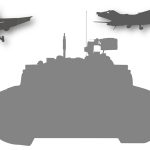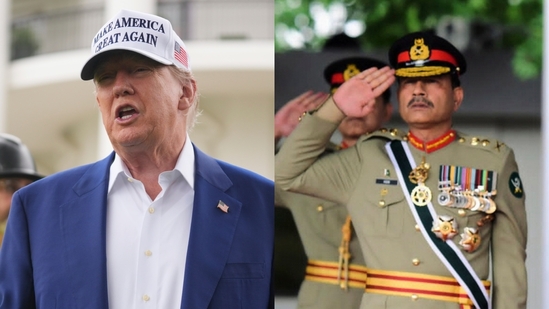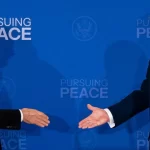
India’s Defence Industrial Mindset needs a Rethink - From Catching Up to Getting Ahead
November 25, 2025

Blog

TRUMP – MUNIR LUNCH MEETING THE US INTERESTS REMAIN PARAMOUNT
Posted by admin
by- Maj Gen Jagatbir Singh, VSM (Retd)
This article was written by the Maj Gen Jagat prior to the U.S. strike on Iran’s nuclear facilities. It offers an unprejudiced insight into the possible objectives behind the much-debated ‘lunch’. As readers will note, many of the author’s assessments have since been vindicated.
Post Operation Sindoor the Pakistan Army is back at centre stage. This was clearly evident with the promotion of General Asim Munir to Field Marshal and also manifested by the increase in the defence budget on 10 June. But what seemed to be a coup d’état the newly promoted Field Marshal along with his trusted aide Pakistan’s NSA Lieutenant General Asim Malik, who also heads the ISI found themselves seated at lunch with President Donald Trump Secretary of State Marco Rubio and US Special Representative for the Middle East Steve Witkoff on 19 June.
The lunch meeting was the first time a US President had hosted the head of the Pakistan’s Army who isn’t also the country’s head of state at the White House sidelining both the President and Prime Minister of Pakistan. For a country that Trump had accused of giving the US “nothing but lies and deceit” and safe havens to terrorists and one that Biden called “one of the most dangerous nations” this marks a dramatic shift in tone which was apparent when on 10 June, General Michael E Kurilla, the head of Central Command, called Pakistan a “phenomenal” counter-terrorism partner, citing Islamabad’s role in helping to capture the alleged Islamic State Khorasan Province planner behind the 2021 Abbey Gate bombing at Kabul airport, an attack that killed 13 US troops and more than 170 Afghan civilians.
Why This Meeting Took Place
The meeting came against the backdrop of rising hostilities between Israel and Iran, with Pakistan’s proximity to Tehran adding strategic weight. The Pakistanis, Trump said, “know Iran very well, better than most”, adding that they are “not happy”. For Pakistan, that comment underscores the reason for the reset in ties with the US. There’s also a more delicate calculation, with Israel pushing the US to join its military campaign against Iran, which shares a 900km border with Pakistan. The geography puts Pakistan in a pivotal position.
The long list of assistance that can be provided by Pakistan to the US and Israel ranges from overflying and over- refueling rights, stationing and operating of drones, provision of air bases, administrative bases, military infrastructure preventing the flow of Iranians into Pakistan due to the conflict and support and safe havens for those Iranians against the present regime and an option from where to launch a land offensive.
However, this assistance to the US and Israel in Iran will be tested by two key challenges. The first being that Pakistan has a significant Shia minority between 15 percent and 20 percent of its population who look to Iran for religious leadership. This demographic reality will be a constrain in Pakistan’s public support for any US military intervention. Further, Pakistan does not recognize Israel. The current crisis will force Pakistan into a diplomatic balancing act, as Pakistan’s close ties with China could pull it in conflicting directions.
China remains Pakistan’s most critical partner, with whom it enjoys deep economic, strategic and military ties. But Beijing’s rise as a global superpower has made it Washington’s principle rival. China has invested $62bn in the China-Pakistan Economic Corridor (CPEC). On the military front, Pakistan procures more than 80 percent of its weaponry from China which maintains an “unshakable” and “all-weather” friendship with Pakistan and considers Iran an ally. Therefore, the question is whether China will remain silent while Pakistan dances to the US tune regarding Iran; logically there should be fissures.
But there is also the fact that as the US does not have any diplomatic ties with Iran a section of Pakistan’s Embassy in Washington represents Iran’s interests in the US. The US may be therefore also be seeking Pakistan’s cooperation in containing or confronting Iran. No wonder the ISPR statement after the meeting said, “a detailed exchange of views also took place on the prevailing tensions between Iran and Israel.”
But apart from the Israel-Iran war. There’s also been talk of US-Pak engagement on critical minerals, cryptocurrency, and Counter Terrorism. Discussions also encompassed avenues for expanding bilateral cooperation in multiple domains including trade, economic development, artificial intelligence, energy and emerging technologies. Apparently, President Trump expressed keen interest in forging a mutually beneficial trade partnership with Pakistan based on long-term strategic convergence and shared interests”.
The former Army Chief General Ved Mallik on X tweeted that “Trump-Munir imbroglio: It is not in Pakistan’s national interest but for personal interest. For post-retirement family life & benefits, Pakistani Generals need patronage of USA & the West. Can’t get those benefits from their association with China.”
Analysis
The U S focus is now on Iran and as Pakistan shares a long land border with Iran the US has signaled its willingness to work with the established power centre. Engaging with the military in Pakistan is the operating reality and a recognition of where implementation capacity in the country lies. For Pakistan, it is an opportunity to reinforce its strategic relevance at a time when interests matter more than principles.
From the Cold War to the 21st-century counterterrorism era, Washington has engaged with Pakistan’s military during periods of urgency in spite of the contradictions in the relationship. General Ayub was part of CENTO and SEATO and yet was friendly with a Communist China and even handed over Shaksgam to them in 1963. General Yahya Khan was the conduit in 1971 between the US and China hence the genocide in East Pakistan was overlooked by the US and the world. General Zia-ul-Haq benefited during the Soviet occupation of Afghanistan, General Pervez Musharraf during the War on Terror and General Kayani during the regional transitions of the Obama years in spite of harbouring the man the world was looking for.
The list is endless as Pakistan remains a master craftsman as far as double dealing goes. These patterns underscore a U S doctrine that privileges capability and continuity when interests are at stake. The decision to meet General Munir in the White House fits this historical arc but is still revealing.
General Munir’s lunch during the Israel- Iran conflict has also fueled speculation in that Washington could push Pakistan to align more openly with the US position, which has historically been supportive of Israel. Such pressure could complicate Pakistan’s delicate balancing act in the Middle East, where it maintains close ties with Iran and other Gulf partners but seeks to avoid getting dragged into regional rivalries that could inflame tensions at home.
Unfortunately, Trumps meeting with people like Munir and his 14 May 2025, meeting with Syrian President Ahmed al-Sharaa in Riyadh, are extraordinary moments that are hard to comprehend. Trump shook hands with the man who led Hayat Tahrir al-Sham (HTS), a former al-Qaeda affiliate, before cameras – later describing him as a ‘young attractive tough guy’. It also says a lot about Donald Trump’s leadership style.
Conclusion
The meeting represented a major reengagement in U S -Pakistan ties, which had largely languished under Trump 1.0 and his predecessor Joe Biden, as both had concentrated on building a relationship with India. But India-U S ties, which have thrived in recent years, are bound to suffer as President Trump continues to make remarks about the U S role in the ceasefire and offered U S mediation in Kashmir.
It also validates the enduring military-to-military track in US-Pakistan ties, bypassing the civilian government, which while worrisome for democratic principles and reflects the reality regarding the balance of power in Pakistan. But the meeting offers an insight into how the U S navigates power structures in a geo strategically important and complex state like Pakistan, and how Pakistan, in turn, presents itself in moments of global uncertainty. Hence institutional effectiveness scores over protocol formality.
While the meeting herald’s resumption of diplomatic engagement between the two countries at the highest level for the first time since 2019”, when President Trump, during his first term, met the then Pakistani premier Imran Khan. Whether this embrace translates into a strategic shift in U S policy remains unclear but it is a pointed reminder that a countries interests remain paramount and tactical moves remain the norm of global politics. The fact of the matter is that there are no free lunches as the US wants to maintain strategic leverage in a region shaped by rising instability.
Karl Marx has said that ‘history repeats itself first as tragedy and then as a farce’, by inviting a hardline supporter of terrorism to lunch and offering deeper cooperation President Trump has made this statement ring true.
Search Blog
Categories
Popular Posts






